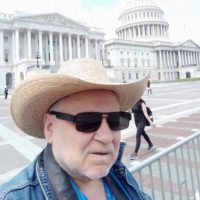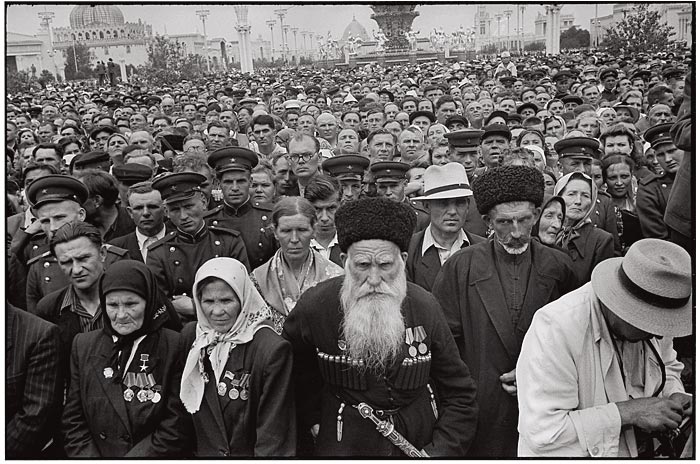Last week, I read Barack Obama's statement in an interview with CNN that in 2014 Russia did not carry out armed aggression to seize the Ukrainian peninsula of Crimea. I wasn't just surprised. I was shocked.
I arrived in Crimea the day after it became known that people in military uniforms without identification marks seized the Crimean parliament and government houses on the night of February 26-27, 2014. Both those who came out in support and those who were against understood very well that these were Russian troops.
Actually, the whole world also understood it. Only Russian President Vladimir Putin pretended that Russia was not involved. He lied that government buildings were seized by Crimean supporters of Russia. After the peninsula was occupied, Putin admitted that it was Russia that carried out this action, brutally violating the world order that has been established since 1945. Until Putin, it was axiomatic. No one even thought to question it.
And suddenly, Obama appears, denying the obvious truth. I can explain it only by the fact that he does not want to admit his guilt for the weak response of the West to Russia’s aggression in 2014. Instead of showing courage, analyzing his actions at the time, and drawing conclusions, he buries his head in the sand.
Meanwhile, several mistakes on the part of the leaders of the Western powers led to today's bloody massacre in Ukraine on a scale not seen since the Second World War. Obama made key mistakes, like not arming Ukraine with the weapons it needed to defend itself.
Could Ukraine have fought off Crimean occupation? A crucial document you should know
In a recent interview with Irish news service RTÉ published on April 4, former US President Bill Clinton expressed his regrets about the Budapest Memorandum he signed in 1994. After the collapse of the Soviet Union, Ukraine gave up the world's third-largest nuclear arsenal in exchange for some material compensation and, as it turned out, a blank piece of paper called the Budapest Memorandum. It contained solid declarations and only one mechanism — to convene the UN Security Council in the event of a nuclear threat. After all, at that time it makes sense why world leaders thought this was an acceptable solution: the Cold War had just ended, the aggressive Soviet Union ceased to exist, and no one could think that someone would want to start a war.
The West perceived Russia as a reliable partner and helped it escape its problems. Neither the Chechen wars, when the Russian army killed tens of thousands of civilians, nor the reversal of democratic freedoms in Russia made the world wary. Russia and its President Vladimir Putin were perceived as equal and civilized partners.
However, in August 2008, Russia started a war in Georgia. I was then in this country and saw that the road to Tbilisi was open. Russian troops did not go further because former US President George Bush sent a warship to the scene of events. This fact alone made the Russians stop.
Soon, Barack Obama became the president, and instead of taking measures to punish the aggressor, he arranged a restart of relations with Moscow. Putin saw that he could do whatever he wanted.
We in Ukraine then understood that our country would be next. After all, Putin already wanted to restore the Soviet empire. And without Ukraine, the second largest republic of the Soviet Union, the empire's existence is impossible.
Six years later, Putin occupied Crimea. And then, he continued the war in Donbas. Barack Obama and other world leaders imposed sanctions, but practice has shown that they did not help. Business and political relations continued to be maintained with Russia. By and large, Moscow was not punished.
In addition, it should be recalled that Obama blocked the decision of Congress to provide Ukraine with lethal weapons. Thus, the pseudo-peacekeeping position encouraged the Russians to intensify their efforts to conquer Ukraine.
The indecisiveness of the West led to the current tragedy where a crazed enemy is trying to destroy Ukraine and the Ukrainian nation.
In April, I traveled through five American states and Washington DC, presenting my book. People wanted victory for Ukraine, but at the same time they asked the question: "Why should we help you?" I reminded them that Ukraine voluntarily gave up its nuclear weapons, counting on security guarantees, particularly from the United States. And it is unfair if such a country – after relying on American leadership – is allowed to be destroyed.
In addition, the defeat of Ukraine will inspire other dictatorial regimes. China will take over Taiwan; North Korea will make every effort not to end its nuclear program. Dictatorships in Africa are also becoming more active. And then so many fires will break out in the world, which will be much more expensive to put out than to press Russia now and help Ukraine restore its territorial integrity and then rebuild it.
The world must draw conclusions: any violation of the world order must be immediately punished.

Yuriy Lukanov, Ukrainian journalist, author of the documentary book “The Press: how Russia destroyed media freedom in Crimea” and a book of war prose “Reporter Volkovsky
."
“Reporter Volkovsky”: a gripping tale of journalism and resilience amidst war




